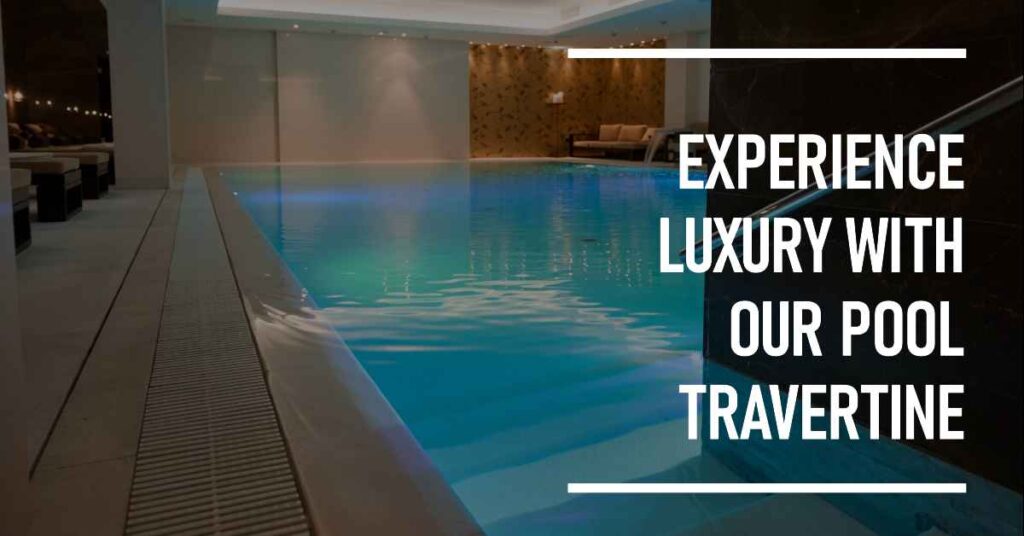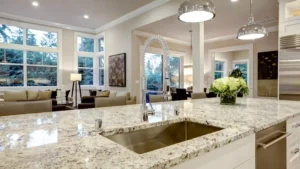Best Pool Travertine Trends to Upgrade Your Pool Deck
When it comes to creating a luxurious and inviting pool area, using pool travertine can transform your space into a stunning oasis. Pool travertine tiles, pool travertine decks, and pool travertine coping have become popular choices for pool renovations, thanks to their timeless beauty and durability. In this article, we will explore how you can enhance your pool area with pool travertine, understand the benefits it offers, and learn about travertine pool maintenance.

What is Pool Travertine?
Travertine is a natural stone that forms from mineral deposits in hot springs, particularly from limestone. Pool travertine is a type of travertine that has been carefully selected for its suitability in pool environments. Its unique porous surface texture and warm color tones make it an ideal choice for pool decks, tiles, and coping.
Table of Contents
TogglePool travertine is a captivating natural stone that has taken the world of pool design by storm. Formed from mineral deposits in hot springs, particularly from limestone, travertine possesses a unique charm that sets it apart from other pool materials. Its use in pool environments has become increasingly popular due to its aesthetic appeal, durability, and practical benefits.
Travertine’s natural beauty lies in its porous surface texture and warm earthy tones, ranging from light creams to rich browns. These colors blend harmoniously with various pool designs, creating an atmosphere of elegance and sophistication.
One of the most significant advantages of using pool travertine is its versatility. It is available in various forms, including tiles, pavers, and coping. Pool travertine tiles can be laid out in intricate patterns, adding a touch of artistry to your pool deck. The smooth and luxurious surface of pool travertine pavers complements the clear blue water, creating an inviting space to relax and unwind. Additionally, travertine coping serves as the perfect border for your pool, providing a polished finish while preventing water from overflowing.
Durability is another hallmark of pool travertine. Its dense composition makes it a reliable option for outdoor use, withstanding the elements and regular wear and tear. Unlike other materials that may fade or degrade over time, properly maintained pool travertine can retain its original beauty for decades.
One of the unique features of pool travertine is its heat resistance. Even under scorching sunlight, the stone remains cool to the touch, making it comfortable for barefoot walking around the pool area. This aspect is particularly cherished in warm climates, where pool decks can become uncomfortably hot with other materials.
Safety is paramount in any pool area, and pool travertine delivers in this aspect as well. Its naturally textured surface provides excellent slip-resistance, reducing the risk of accidents and ensuring a worry-free pool experience for both children and adults.
Advantages of Using Pool Travertine
Timeless Elegance
Pool travertine offers a sense of elegance and sophistication that complements various architectural styles. Its natural beauty adds a touch of luxury to your pool area, making it a perfect space for relaxation and entertainment.
Durability and Longevity
Travertine is known for its durability, making it a reliable option for outdoor use. When properly maintained, pool travertine can withstand the test of time and resist fading and weathering.
Heat Resistance
One of the significant advantages of pool travertine is its heat-resistant properties. Even under scorching sunlight, the stone remains cool to the touch, allowing you to walk comfortably barefoot around the pool.
Slip-Resistance
Safety is paramount around the pool area. Pool travertine’s natural texture provides a slip-resistant surface, reducing the risk of accidents and ensuring a worry-free pool experience.
Enhancing Your Pool with Travertine
Pool Travertine Tiles
Pool travertine tiles offer a versatile option for your pool area. They come in various sizes and finishes, allowing you to create unique patterns and designs. The tiles can be laid out neatly, giving your pool a clean and sophisticated look.
Pool Travertine Deck
The pool deck is the area surrounding the pool, and using pool travertine for this space adds a touch of elegance and luxury. The soft earthy tones of the stone complement the clear blue water, creating a serene and inviting atmosphere.
Pool Travertine Coping
Pool travertine coping serves both a functional and aesthetic purpose. It acts as a border for the pool, providing a smooth edge and preventing water from spilling over. Additionally, it enhances the overall appearance of the pool, giving it a finished and polished look.
Pool Renovation with Travertine
If you already have a pool and want to give it a facelift, renovating it with pool travertine can breathe new life into your outdoor space. The renovation can include adding travertine tiles to the pool surface, coping, and deck, transforming the pool’s entire look.
Travertine Pool Maintenance
Travertine pool maintenance is essential to preserve the beauty and longevity of your pool area. Proper care and attention will ensure that your pool travertine remains in pristine condition for years to come. In this comprehensive guide, we will delve deeper into the best practices for maintaining your travertine pool and addressing common issues that may arise.
Regular Cleaning
Regular cleaning is the cornerstone of travertine pool maintenance. To keep your travertine looking its best, you should clean the surface on a routine basis. Use a soft brush or mop to remove debris, dirt, and leaves that may have accumulated on the stone’s surface. Avoid using abrasive materials or harsh chemicals, as they can damage the natural texture and finish of the stone. Instead, opt for a mild detergent mixed with water to gently cleanse the travertine.
Sealing the Travertine
Sealing is a crucial step in travertine pool maintenance. Travertine is a porous stone, and sealing helps protect it from water absorption and staining. It creates a protective barrier on the surface without altering the stone’s natural appearance. Sealing also enhances the stone’s resistance to chemicals and UV rays, which are common in pool environments. It is recommended to reseal the travertine every 1 to 2 years, depending on the level of usage and exposure.
Removing Stains
Despite careful maintenance, stains may occur on your travertine pool. Promptly addressing stains is essential to prevent them from becoming permanent. The type of stain will dictate the best approach for removal. For organic stains like food or algae, create a poultice using a mixture of baking soda and water. Apply the poultice to the stain, cover it with plastic wrap, and let it sit for 24-48 hours before gently scrubbing it away. For oil-based stains, use a specific stone stain remover designed for travertine. Always follow the manufacturer’s instructions when using stain removers.
Preventive Measures
Taking preventive measures can go a long way in maintaining your travertine pool. Place mats or rugs near pool entrances to minimize the amount of dirt, sand, and debris that can scratch the travertine surface. Encourage pool users to rinse off before entering the pool to reduce the transfer of oils and lotions onto the stone. Also, avoid using sharp or heavy objects on the travertine, as they can cause scratches or chips.
Addressing Efflorescence
Efflorescence is a common issue in pool travertine. It appears as a white, powdery residue on the stone’s surface and is caused by the migration of mineral salts from within the stone. To address efflorescence, use a soft brush or a dry cloth to remove the residue. Avoid using water during this process, as it can exacerbate the issue. If efflorescence persists, consult a professional stone care expert to identify the underlying cause and recommend appropriate solutions.
Winter Care
In regions with freezing temperatures, winter care is crucial to prevent damage to your travertine pool. Before the first frost, drain the pool to the appropriate level to avoid water freezing and expanding within the stone. Also, ensure that the pool deck and coping are thoroughly cleaned and sealed before winter to protect them from the harsh elements.
Professional Maintenance
While regular cleaning and maintenance are essential, it is wise to schedule periodic professional maintenance for your travertine pool. Professional stone care experts have the expertise and tools to deep clean, repair, and reseal your travertine, ensuring its longevity and beauty.
Elevate Your Pool with Travertine Mastery
Transform your pool area with our expert services. Our team specializes in Swimming Pool Tile Installation Lowell to ensure a flawless, elegant finish. At SF Marble & Granite Inc., we blend quality craftsmanship with a personal touch to make your outdoor space both beautiful and inviting.
Conclusion
Pool travertine is an excellent choice for enhancing your pool area. Its timeless elegance, durability, heat resistance, and slip-resistance make it a top option for pool decks, tiles, and coping. Proper maintenance will ensure your travertine pool retains its beauty for years to come. So, why wait? Call our team at Sfmarbleandgraniteinc.
FAQs
Is pool travertine suitable for all climates?
Pool travertine is well-suited for most climates due to its heat-resistant and durable properties. However, it is essential to protect it during freezing temperatures to prevent damage.
Can I install pool travertine myself?
While it is possible to install pool travertine as a DIY project, it is recommended to hire professionals for a flawless installation, especially for larger pool areas.
How often should I seal my travertine pool?
Sealing frequency depends on factors like usage and weather conditions. Generally, resealing every 1-2 years is advisable to maintain the stone’s integrity.
Does travertine require special cleaning products?
Travertine can be cleaned using a mild detergent and water. Avoid acidic or abrasive cleaners that could harm the stone’s surface.
Can I use pool travertine indoors as well?
Yes, pool travertine’s elegance extends indoors, making it an excellent choice for flooring, countertops, and other interior applications.
Contact Us







